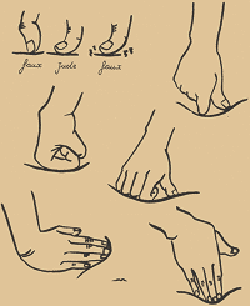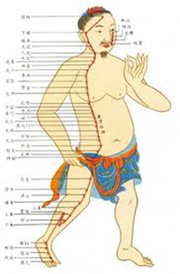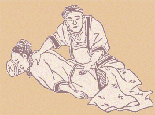|
Shiatsu (Shi=finger, Atsu=pressure) is a therapy based on the combination of the traditional Chinese theories.
Shiatsu improves our health by re-balancing our living energy in the body which is the foundation of our physical, mental and emotional health. |
 |
By stretching, rotation and applying pressure with the thumbs and palms of the hands, the circulation of energy is improved. The pressure is made on specific points called tsubos which are the same as the ones in acupuncture.
Shiatsu is not a medicine, it is a technique which enables prevention of disease, general malaise and pain but it also can be a supplement to a cure, to help with chronic illnesses and convalescence, relieve muscular tension, joint pains, digestive problems, migraines and headaches, stiff neck, eczema, etc… |
|
|
In the traditional treatment of internal medicine by the legendary Yellow Emperor (Huang Di Nei Jing, XVIIIe B.C.), there is a mention of what is currently called Shiatsu under the name of Angyo/Do In. It formed an integral part of medicine at that time. It then took the name of Anma.
Traditional Anma gradually lost its medical quality to become a popular practice in Japan, carried out by families to prevent imbalances of the circulation of energy, which showed up in the body as digestive disorders, circulatory issues, respiratory problems, sleep problems and a feeling of general unhappiness.
|
 |
The name SHIATSU appeared in 1920 in Japan and joined together Chinese medicine, Do In and Anma. But it was only in 1955 that the word shiatsu appears in the official texts of the Ministry for Japanese Health. The basic training is two years in Japan and is approved by the Ministry for the Public health. It was in 1970 that Shiatsu was introduced into France by eminent Japanese Masters, in particular the Master Yuichi Kawada, with whom I studied further into this therapy. |
|
| Yoseido® shiatsu school philosophy |
top |
|
Yoseido® philosophy, developed by Yuichi Kawada in Belgium, leads to knowledge of the 8 major vessels, called Meridian lines which combine several meridian lines and whose treatment of them gives very effective results. It is ‘Essential’ Shiatsu that Maître Kawada developed, throughout a life dedicated to the shiatsu as he travelled the world: in Japan, the Philippines, the United States, France and finally Belgium where he teaches still today. It is his knowledge of the body and human psychology that make of him the well respected expert and Master he is today.
He is one of the Masters who introduced Shiatsu in France and the FFST (French Federation of Traditional Shiatsu) still refer to his name. |
|
|
Shiatsu is one of the complementary therapies
(chiropratic, homeopathy, anthroposophic medicine, Chinese medicine (including acupuncture), naturotherapy, phytotherapy, osteopathy, shiatsu) accepted in Europe as « non conventional medicine that deserves interest » by a resolution of European Parliement voted on May 29 1997 at the initiative of Paul Lannoye, Belgian European Deputy. |
 |
|
|

